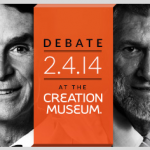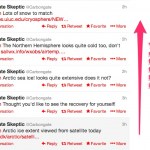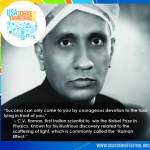Physical Sciences
Ashutosh Jogalekar has a response to my post from yesterday complaining about his earlier post on whether multiverses represent a philosophical crisis for physics. I suspect we actually disagree less than that back-and-forth makes it seem-- he acknowledges my main point, which was that fundamental theoretical physics is a small subset of physics as a whole, and I don't disagree with his point that physics as a discipline has long been characterized by a reductionist sort of approach-- always trying to get to smaller numbers of fundamental principles.
Our real point of disagreement, I think,…
Apparently, Martin Cothran believes that there is no life elsewhere in the universe, and that this unimaginably vast emptiness is evidence that a god created us. I don't understand the logic, but then I don't understand most of his weird leaps in this post on how life on other planets is like believing in the Flying Spaghetti Monster.
First, there is the naive scientific oversimplification.
We are told by many New Atheist scientists in particular (who like to mark their territory) that a belief can only be scientific if it is falsifiable. This is their demarcation criterion of choice and they…
The very last section of the book-in-progress (at least the draft that's with my editor right now...) is titled "Science Is Never Over," and talks about how there are a nearly infinite number of phenomena that you can investigate scientifically. The universe is a never-ending source of amazement and wonder, with surprisingly rich dynamics in the simplest of things. I mean, look at the thousands of words I've gotten out of talking about sticky tape...
This is why I sigh heavily whenever I see a title like Ashutosh Jogalekar's "Should Physicists Stop Looking for Fundamental Laws. This is, at…
Having spent a lot of time solving equations related to sticky tape models, including trying to work solutions in my head while driving to Grandma and Grandpa's with the kids, and making some measurements of real tapes, there was only one thing left to do: try simulating this problem in VPython. Because I'm a physics nerd who knows just enough about programming to be dangerous...
Finding the full solution to the real sticky tape scenario is kind of a miserable process, because it involves a long continuous tape with charge all down its length, which is kind of complicated, and then there's a…
When I wrote about Benjamin Bratton's anti-TED rant I only talked about the comment about the low success rate of TED suggestions. That was, admittedly, a small piece of his article, but the rest of it was so ludicrously overheated that I couldn't really take it seriously. It continues to get attention, though, both in the form of approving re-shares on my social media feeds, and in direct responses such as a rebuttal from Chris Anderson himself and most recently a long piece by Christiana Peppard at Medium, which are getting their own collection of approving re-shares. So I guess I ought to…
As you know, Bill Nye has agreed to engage in a debate about evolution with Ken Ham at the Kentucky Creation Museum. You may also know that I suggested that this debate was a bad idea, not so much because it is Bill Nye doing it (he’s a great spokesperson for science and science education) but because the whole idea of a debate is questionable for a number of reasons (discussed here).
Bill recently made a few comments on the debate on CNN.
Here, I’d like to list a handful of the points I’d make if I was doing this debate.
It is not necessary or even possible to argue against “creationism…
As a follow-up to yesterday's post about liberal education and the failure modes thereof, I thought I should try to do something constructive and make suggestions regarding how you might go about a "poetry for physicists" kind of thing. After all, one of the things I find intensely frustrating about a lot of "crisis in ____" discussions is the lack of specific suggestions, so throwing out a "here's a problem, good luck with that" post would be suboptimal behavior on my part. This required some reflection on the question of just what I got out of my "liberal arts" classes back in the day--…
One of the many ancillary tasks associated with my job that I wish I was better at is the advising of students. More specifically, the advising of students who aren't like I was at that age.
What I mean by that is that when I was a student, I didn't need to be convinced of the utility of liberal arts education. I had specifically chosen to go to williams in part because of the small size (having grown up in a small town, I found it more congenial), but also because I was never only interested in science. I always enjoyed reading books and discussing history and politics, so I didn't need a…
Welcome to the rebooted science interview series here at Confessions of a Science Librarian! The previous incarnation mostly concentrated on people in the broadly defined scholarly communications community, like Mark Patterson of eLife, Peter Binfield and Jason Hoyt of PeerJ or author Michael Nielsen.
The series has been extremely irregular for the last few years so I thought my more recent involvement with Canadian science policy advocacy presented an interesting opportunity to start over. In particular, my participation in the recent iPolitics science policy series presented itself as a…
Proponents of intelligent design make a large number of arguments regarding the inadequacies of evolution, and the shortcomings of current scientific practice. All of these arguments are wrong.
That, however, is not the end of the problems besetting ID. There is also the fact that there really is no theory of intelligent design. For all their nattering about how ID has the makings of a scientific revolution, they are stuck nonetheless with a “theory” that actually asserts very little. There is ultimately nothing more to their argument than the claim that at some point in natural history,…
"To be is to be the value of a variable." -Willard Van Orman Quine
It's the end of the week once again, and the very end of our Year In Space 2014 Wall Calendar giveaway! So for this week's Ask Ethan column, after dipping into our question/suggestion box, I'm very pleased to let Vera from Italy know that her question was the winning one, as she asked:
I saw the video you posted about the variable star RS Puppis, by the Hubble Space Telescope, and I really would like a post about what exactly are variable stars.
Thank you very much Ethan!! :-)
So -- no burying the lede here -- there was…
These days, Dr. Oz seems to stand for everything I oppose in medicine: Fear mongering, quackery, making claims that he can't back up with science, and, of course, filthy lucre. On second thought, I'm not against filthy lucre per se. In fact, I wouldn't mind having some of it myself. However, I also want to keep my integrity, and if getting a piece of that filthy lucre involves compromising myself, my scientific credibility, and my overall credibility as much as Dr. Mehmet Oz has done over the last several years, I'll have to settle for my comfortable upper middle class existence. It's not so…
The best way to not look like an idiot is to shut up. Works every time. Why just a few minutes ago I said something really stupid because I confused UPS and USPS. Should have just kept my mouth shut, but I didn't.
This time of year a lot of people start sounding like idiots, quite possibly because they are idiots (but see below for alternative explanations), when it comes to global warming. For example, someone who may or may not be a "global warming denier" (i.e. a person who does not believe in physics) sent me, out of the blue, this string of tweets:
First he tells me that the ice…
Over at The Economist, we have this brief interview with Edward Frenkel, a mathematician at Berkeley. We met Frenkel in this post from last week. Frenkel has a new book out called Love and Math, one copy of which is currently residing on my Kindle.
One part of the interview caught my attention:
Symmetry exists without human beings to observe it. Does maths exist without human beings to observe it, like gravity? Or have we made it up in order to understand the physical world?
I argue, as others have done before me, that mathematical concepts and ideas exist objectively, outside of the…
I've been distracted lately — it's end of the world semester time — and so I didn't have time to comment on this recent PNAS paper that reports on dramatic sex differences in the brains of men and women. Fortunately, I can just tell you to go read Christian Jarrett, who explains most of the flaws in the study, or you can look at these graphical illustrations of the magnitude of the differences. I just want to add two lesser points.
First, let's all be really careful about the overselling of fMRI, 'k? It's a powerful tool, but it's got serious spatial and temporal resolution limitations, and…
X-STEM - presented by Northrop Grumman Foundation and MedImmune - is an Extreme STEM symposium for elementary through high school students featuring interactive presentations by an exclusive group of visionaries who aim to empower and inspire kids about careers in science, technology, engineering and mathematics (STEM). These top STEM role models and industry leaders are sure to ignite your students’ curiosity through storytelling and live demonstrations.
Our spotlight on our X-STEM Speakers continues with Acoustical Scientist Dr. James West:
Looking…
I know I said there weren't going to be physics posts for a while, but yesterday our Communications office passed along a media request about this paper on feedback cooling of BEC, from some sort of communications-person mailing list. I'd seen it talked up elsewhere-- here, for example, so I banged out an email to the reporter in question. Who didn't use any of my stuff in the story that ran late last night.
Having put in the work, though, I may as well get something out of it, so here's the email I sent. Questions in bold are from the original request. The paper is in the New Journal of…
We had a very late colloquium talk on Monday-- on the next-to-last day of our fall term exam period, so student turnout was a little disappointing-- by the science historian Dieter Hoffmann from the Max Planck Institute for the History of Science, who was in town visiting a colleague in our history department. He told us the story of Fritz Reiche, a student of Max Planck's whoc ended up having a Union College connection (which was a part of why Hoffmann wanted to give the talk).
Reiche did his Ph.D. under Planck, in 1907, then spent time at a few other great institutions in Germany,…
C.V. Raman – Physicist
First Indian scientist to win the Nobel Prize in Physics. Known for his pioneering work in the scattering of light, now commonly called the "Raman Effect"
In 1930, at a time of limited opportunities for Indian scientists, his groundbreaking work in optics and the scattering of light led him to become one of the most renowned scientists that India has ever produced!
C.V. Raman (born Chandrasekhara Venkata Raman in 1888 in Tiruchinapalli, Tamil Nadu, India) was raised in studious home environment. His father was a lecturer in mathematics and physics. C.V. would go on to…
"My idea of perfect happiness is a healthy family, peace between nations, and all the critics die." -David Mamet
As a theorist in physics, most of my research time is spent looking for errors in painstaking calculations, writing and running simulation code, and trying desperately to connect some very abstract concepts to potential observables in either experiments or the Universe.
But for experimentalists, the key difficulty is always some variation on one unifying theme: getting good data. That's why this weekend, I'm proud to bring you a fantastic takeoff of Daft Punk's Get Lucky by…






